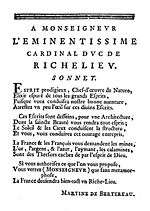Martine Bertereau
Martine Bertereau also known as Baroness de Beausoleil (born c. 1600, France – died after 1642, Vincennes, France) was a pioneering French woman mining engineer and the first recorded female mineralogist, who traveled extensively in Europe in search of mineral deposits. She surveyed the sites of hundreds of potential mines in France in the service of the French King. Her writings describe the use of divining-rods as well as much useful scientific and practical advice which she derived largely from the Roman engineer Vitruvius's book on architecture, De architectura. They are a unique glimpse into the craft-skills involved in mining in the seventeenth century.[1]

Life
Martine Bertereau came from a noble French family in the Touraine who were traditionally engaged in mining. She married Jean de Chastelet, Baron de Beausoleil et d'Auffenbach an expert in mining.[2] The Holy Roman Emperor, Rudolph, had made him the commissioner general of the mines of Hungary. In this capacity they traveled widely visiting mines in South America, Hungary and Germany. In 1626, they were commissioned by King Henry IV to survey France for possible mine locations and revive the French mining industry. They established a base at Morlaix in Brittany. Their activity aroused suspicions in the provincial clergy that their methods involved magic and a priest, the Prevot Provincial named, Touche-Grippé searched their châteaux looking for incriminating material. No charges we made but the couple were forced to leave France. They were invited back under King Louis XIII to continue their work.
The baroness wrote two reports on their work, the first, Véritable déclaration de la découverte des mines et minières was published in 1632 and listed 150 French mines the couple had discovered.[3] The second was in the form of poem addressed to Cardinal de Richelieu La restitution de pluton, (1640) is really a plea for them to be paid for the work undertaken which they had carried out at their own expense.[4]
In it she seeks to defend her unusual position as a woman in the mining industry.
"But how about what is said by others about a woman who undertakes to dig holes in and pierce mountains: this is too bold, and surpasses the forces and industry of this sex, and perhaps, there is more empty words and vanity in such promises (vices for which flighty persons are often remarked) than the appearance of truth. I would refer this disbeliever, and all those who arm themselves with such and other like arguments, to profane histories, where they will find that, in the past, there have been women who were not only bellicose and skilled in arms, but even more, expert in arts and speculative sciences, professed so much by the Greeks as by the Romans.”
It is speculated that the demand for money made the government move against them on charges of withcraft. Jean de Chastelet was imprisoned in the Bastille and Martine and her eldest daughter in Vincennes. Both died in prison.[4]
See also
References
- How to Find Water: The State of the Art in the Early Seventeenth Century, Deduced From Writings of Martine de Bertereau (1632 and 1640) The History of Earth Sciences Society, Volume 28, Number 2 / 2009. Pages 204-218
- Curiosities of Olden Times S. Baring-Gould, Kessinger Publishing, (2004) Page 154, ISBN 0-7661-8235-5
- "The curious talents and tales of the Baroness de Beausoleil". magazine.cim.org. Retrieved 2020-03-28.
- Bertereau, Martine de Baronne de Beausoleil Archived 2016-03-03 at the Wayback Machine Bibliography of Mineralogy, The Mineralogical Record, 2011.
Bibliography
- Wonderful history in modern times, Louis Figuier, Hachette, Paris, 1860
- The Veterans mineralogists of the kingdom of France, Nicolas Godet, Ruault, Paris, 1779
- Biography universal ancient and modern, Michaud, Paris, 1843